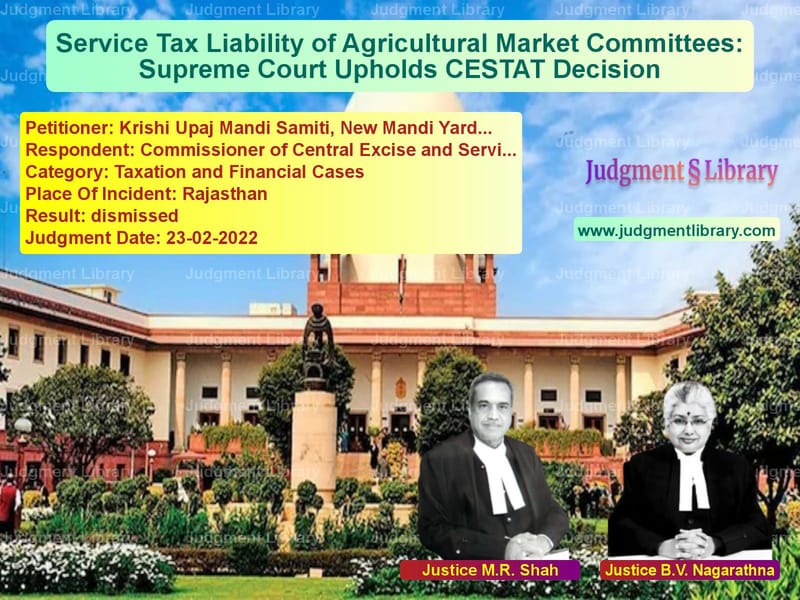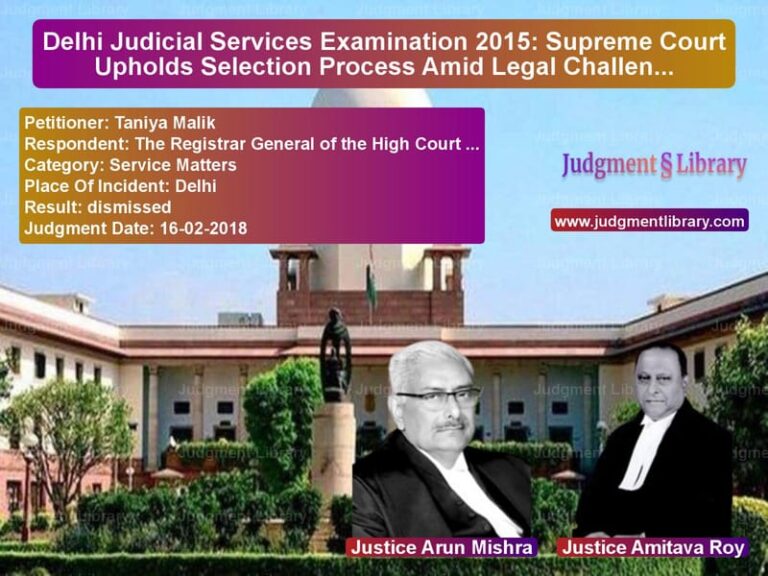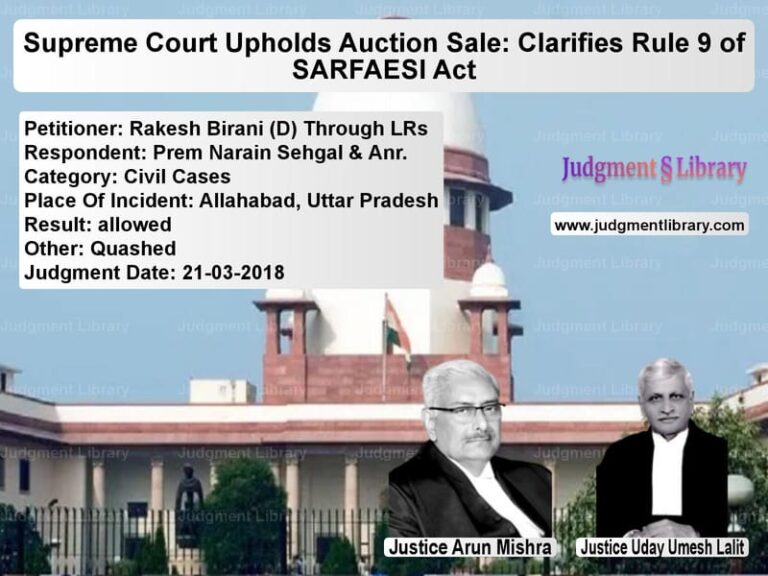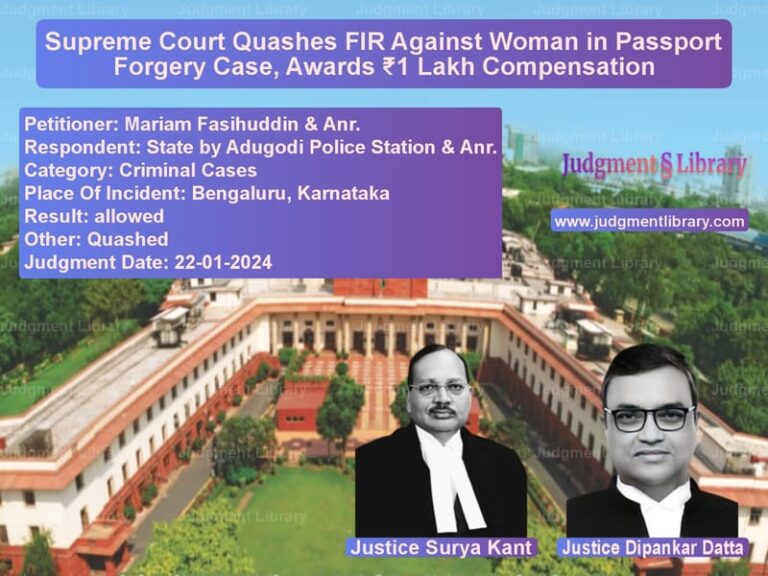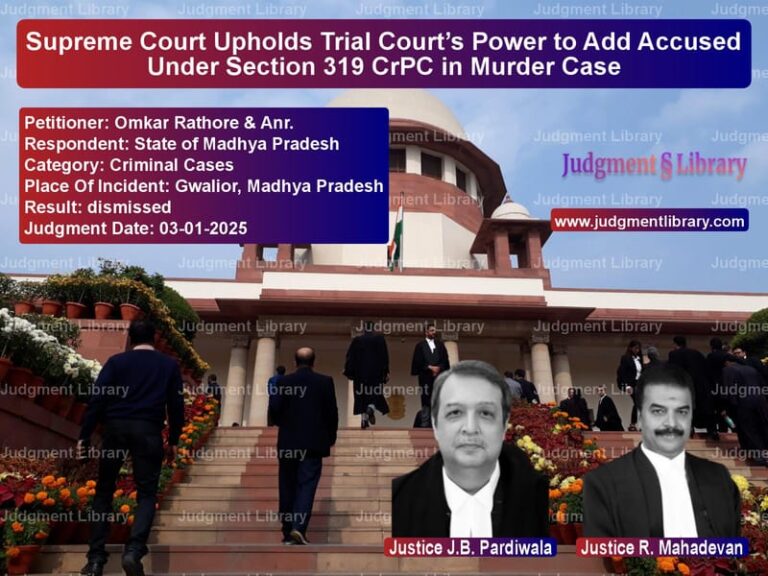Service Tax Liability of Agricultural Market Committees: Supreme Court Upholds CESTAT Decision
The long-standing dispute over the service tax liability of Agricultural Produce Market Committees (APMCs) in Rajasthan has been settled by the Supreme Court in the case of Krishi Upaj Mandi Samiti, New Mandi Yard, Alwar vs. Commissioner of Central Excise and Service Tax, Alwar. The judgment, delivered on February 23, 2022, confirms that APMCs are liable to pay service tax on renting of immovable property prior to July 1, 2012, but are exempt thereafter due to the introduction of the Negative List regime.
Background of the Case
APMCs in Rajasthan operate under the Rajasthan Agricultural Produce Markets Act, 1961 (the Act, 1961). They regulate the sale of agricultural produce in designated market areas and collect market fees for issuing licenses to traders, agents, factories, and companies. Additionally, they rent out land and shops to traders, generating revenue.
The revenue department took the view that APMCs were liable to pay service tax on their income from renting out shops and land. However, APMCs contended that their activities were statutory functions and thus exempt under a 2006 circular issued by the Central Board of Excise and Customs (CBEC).
The case was first decided by the Customs, Excise and Service Tax Appellate Tribunal (CESTAT), which ruled that APMCs were liable for service tax only until July 1, 2012, when the Negative List regime came into effect. The APMCs challenged this decision in the Supreme Court.
Petitioners’ Arguments
The APMCs argued that:
- Under Section 9 of the Act, 1961, they were mandated to allot land, sheds, and shops to traders, making it a statutory function.
- Service tax was not applicable to statutory functions under the CBEC’s 2006 Circular, which exempted services provided by sovereign/public authorities.
- The rent collected was deposited into the Market Committee Fund, used for market development, and thus should not be considered a commercial activity.
Respondents’ Arguments
The Revenue department countered that:
- Allotment of shops and land was not a mandatory statutory function under the Act but an enabling provision.
- Service tax was applicable since APMCs were engaging in a commercial activity by renting out property.
- The 2006 circular only exempted fees levied as a compulsory statutory charge deposited into the Government Treasury, which was not the case here.
- On and after July 1, 2012, renting of property for agricultural purposes was specifically included in the Negative List, proving it was taxable earlier.
Supreme Court’s Observations
On Whether Renting of Shops and Land is a Statutory Function
The Supreme Court rejected the argument that renting out shops and land was a statutory function, stating:
“Section 9(2) is an enabling provision and the words used are ‘market committee may’. Therefore, wherever the legislature intended that a particular activity is mandatory, it has used the word ‘shall’. The activities mentioned in Section 9(2)(xvii) cannot be said to be mandatory statutory duties.”
On Applicability of the 2006 Circular
The Court clarified that the 2006 circular did not exempt all activities of public authorities:
“The exemption notification should not be liberally construed. Only activities that are in the nature of statutory obligations, with fees compulsorily levied and deposited into the Government Treasury, qualify for exemption. The rent collected by APMCs does not fulfill these conditions.”
On Liability to Pay Service Tax
The Court held that APMCs were liable to pay service tax for renting of shops and land until July 1, 2012:
“The Negative List regime introduced on July 1, 2012, specifically exempted such activities, implying that they were taxable prior to this date. If the exemption already existed, there would have been no need to include them in the Negative List later.”
Final Judgment
The Supreme Court upheld the CESTAT ruling and ruled:
- APMCs were liable to pay service tax on renting of immovable property up to June 30, 2012.
- From July 1, 2012, APMCs were exempt under the Negative List.
- APMCs were not entitled to any refund of service tax paid before the Negative List came into force.
- The appeal of APMCs was dismissed.
Implications of the Judgment
This ruling has important implications for Agricultural Market Committees across India:
- Clarification on Taxation: It confirms that renting of immovable property by APMCs was taxable before the Negative List but exempt afterward.
- Limited Scope of Exemptions: The judgment reinforces that tax exemptions must be explicitly stated in law and cannot be broadly interpreted.
- Precedent for Other Cases: The ruling may impact similar disputes involving government bodies engaging in activities that generate revenue.
The Supreme Court’s decision provides clarity on the taxation of APMCs, ensuring compliance with service tax laws and reinforcing that exemptions must be clearly defined and adhered to.
Petitioner Name: Krishi Upaj Mandi Samiti, New Mandi Yard, Alwar.Respondent Name: Commissioner of Central Excise and Service Tax, Alwar.Judgment By: Justice M.R. Shah, Justice B.V. Nagarathna.Place Of Incident: Rajasthan.Judgment Date: 23-02-2022.
Don’t miss out on the full details! Download the complete judgment in PDF format below and gain valuable insights instantly!
Download Judgment: krishi-upaj-mandi-sa-vs-commissioner-of-cent-supreme-court-of-india-judgment-dated-23-02-2022.pdf
Directly Download Judgment: Directly download this Judgment
See all petitions in GST Law
See all petitions in Tax Evasion Cases
See all petitions in Tax Refund Disputes
See all petitions in Banking Regulations
See all petitions in Judgment by Mukeshkumar Rasikbhai Shah
See all petitions in Judgment by B.V. Nagarathna
See all petitions in dismissed
See all petitions in supreme court of India judgments February 2022
See all petitions in 2022 judgments
See all posts in Taxation and Financial Cases Category
See all allowed petitions in Taxation and Financial Cases Category
See all Dismissed petitions in Taxation and Financial Cases Category
See all partially allowed petitions in Taxation and Financial Cases Category

